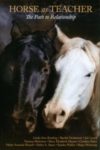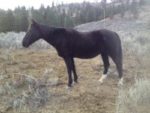Stress-Induced Ulcers in Horses Pt.2
Here is the second part of Madalyn Ward’s piece on detecting stress, the effects of it and possible treatment solutions:
~~~~~~~~~~~~~~~~~~~~~~~~~~~~~~~~~~~~~~~~~~~
Effects of Stress on the Body
Stress is not some imaginary emotion that can be controlled with will power. When the body perceives stress, real or imagined, it secretes hormones that have profound effects on many systems, including digestion. Any acute stressful event will cause digestion to cease as
the body prepares to fight or escape. Blood flow is diverted away from the digestive tract to the heart and muscles, secretion of saliva and digestive enzymes is slowed, intestinal motility slows and nutrient absorption stops. The body under acute stress also slows the production of protective mucus that lines the stomach wall and bicarbonate that buffers the stomach acid.
If stress happened infrequently the horse could relax after a stress and digestion would return to normal. The problem comes when acute bouts of stress come repeatedly or low level stress persists on a constant level. In this case the horse continues to eat but proper digestion does not occur. This can cause gas or impaction type pain or ulcers in horses that are not producing enough protective mucus or buffering bicarbonate.
Physiological effects of stress in horses:
- Blood flow diverted away from the digestive system to the heart and muscles
- Decreased secretion of saliva and digestive enzymes
- Decreased intestinal motility
- Decreased absorption of nutrients
- Decrease in production of protective mucus and buffering bicarbonate
How to Reduce Stress in Horses
The bottom line is we want our horses to be stress free but this is almost impossible to achieve in real life. What we can do is take steps to prevent the development of ulcers in horses that are experiencing the basic stresses that are part of being in training. We can make sure the horse gets adequate turnout or work to match his energy level. We can feed smaller, more frequent, easily digested meals with more hay and less starch and sugar high concentrates. We can make sure horses get contact with other horses and provide them with a routine and good management.
We can and should plan to support the horse’s digestive tract with nutrient dense, whole food supplements, pre and probiotics, digestive enzymes, soothing herbs and products that contain nitric oxide precursors to help with blood circulation to the digestive tract. Different type and temperament horses respond differently to stress and will need different digestive support for best results. Check out Horse Harmony to help you determine your horse’s temperament type and look at our Feeding Guide to help select the best digestive support.
http://www.holistichorsekeeping.com
http://www.horseharmony.com
http://blog.horseharmony.com
http://www.facebook.com/HorseHarmony
Twitter: madalynward


